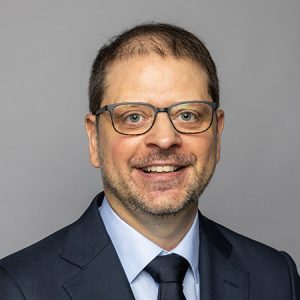Sep. 8, 2025
This is part of a series of Q&As introducing faculty who have joined the College of Health Sciences for the 2025–26 academic year. Meet all of our new faculty members.
Kevin Cloninger
Teaching professor, Department of Health Sciences
What classes are you teaching this semester?
This semester, I’m teaching a topics course called The Art and Science of Well-Being. Next semester, we’ll be updating the title to The Science of Well-Being as part of our work to develop a Health and Wellness Coach Certification Program in the College of Health Sciences.
In this course, students explore the emerging field of well-being science, which brings together insights from psychology, neuroscience and medicine, placing them in dialogue with disciplines like philosophy, anthropology and sociology. Students read the primary literature, examine evidence-based strategies to cultivate well-being and, most importantly, experiment with applying these tools in their own lives. The goal is to support both intellectual and personal growth to help explore identity and direction.
Tell us about yourself. What is your background?
My background bridges science, philosophy and education. I earned my doctorate in Curriculum and Instruction, in addition to earlier degrees in biology and philosophy. I taught science and philosophy at the elementary through high school levels early in my career, and I later worked in teacher education.
While in graduate school, I cofounded a nonprofit called Anthropedia with two close friends who were in medical school. Over the past two decades, I served as executive director of the foundation, overseeing research and the development of programs and tools to help people manage stress and cultivate sustainable well-being. That work has taken me around the world — from TV and radio interviews to presentations and collaborations in countries like Sweden, Italy, Portugal, Brazil and Korea.
What brought you to Mizzou? To your field?
Anthropedia is partnering with the university to build a program of health and wellness coaching. I was hired as a professor to help translate all this work into a university environment. The interdisciplinary training we created was among the first to be accredited by the National Board of Health and Wellness Coaches, and our goal is to bring this program in a new and innovative form to the University.
At present, Anthropedia has trained 2,000 coaches in more than 30 countries, and we’ve studied our methods to prove their efficacy in St. Louis and Sweden thanks to large grants we received to understand the impacts on mental health and well-being. I am very excited to bring these ideas and tools to the Mizzou community and to work on building relationships with entities around the state to offer this much-needed physical and mental wellness support.
What is your favorite thing about your job?
Helping people better understand themselves. So many of us go through life unsure of where we fit or what brings our lives meaning. I find it deeply rewarding to guide students and clients through that process of discovery.
What has you excited for this semester?
I’m excited to be back in the classroom — especially at the university level. Sharing knowledge and tools around well-being with Mizzou students feels like a great next chapter.
What is a fun hobby or activity that you enjoy outside of work?
I love music, paddle sports like tennis and pickleball and traveling. But most of all, I enjoy time with friends and family.
Share a memorable moment from your time teaching – something funny, touching, or just downright unforgettable!
A few years ago, my father and I were invited to give keynote lectures in Seoul, South Korea, on the Temperament and Character Inventory (TCI) — a personality tool he developed that’s now widely used, especially in psychotherapy.
We had no idea how popular it was in Korea. After our first lecture, students lined up by the dozens — not to ask questions, but for photos. The organizers laughed and told us that the students were more excited about the selfies than the lectures! We spent the rest of the visit posing with heart hands and peace signs like we were K-pop stars. It was surreal and very moving. It reminded me that when your work truly resonates with people — especially across cultures — it creates a deeper connection than you might expect.
What is your hidden talent?
I nearly left college to study music full-time. I’ve written music for feature films and still play piano and guitar. Music has always been a big part of my life — it grounds me.
What is the best piece of advice you’ve ever received, and who gave it to you?
“Take your work seriously, but don’t take yourself too seriously.” — from a mentor during my early teaching days. That advice has stuck with me, especially in fields like wellness and education where humility and humor matter.
